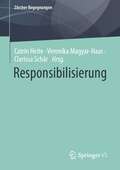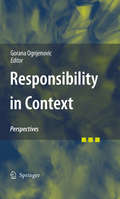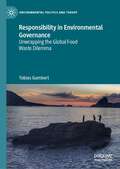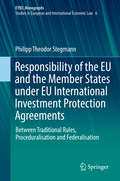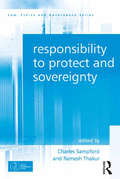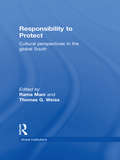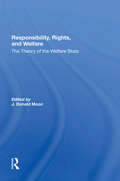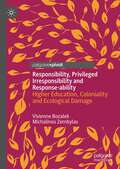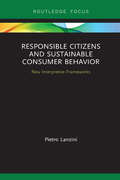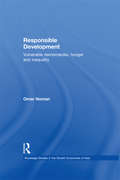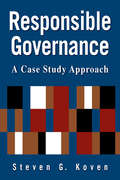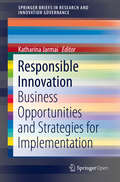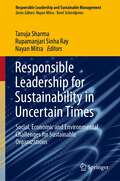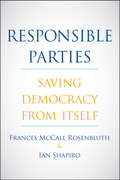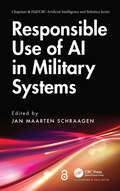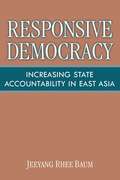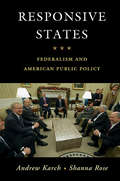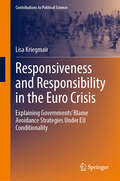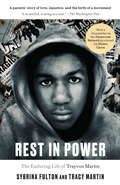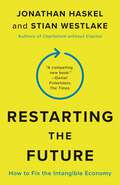- Table View
- List View
Responsibilisierung (Zürcher Begegnungen)
by Clarissa Schär Veronika Magyar-Haas Catrin HeiteDer Band prüft den Begriff Responsibilisierung aus unterschiedlichen disziplinären Perspektiven auf seine Aktualität, sein analytisches Gewicht und seine theoretischen Bedeutungen und bringt so die Erziehungswissenschaft mit der Soziologie, der Philosophie oder der Geschichtswissenschaft ins Gespräch. Es wird sowohl danach gefragt, welche tragfähigen theoretischen, analytischen und politischen Perspektiven mit einer positiven Bezugnahme auf die Begriffe ‹Verantwortung› und ‹Responsibilisierung› verbunden sind, als auch danach, welche Kritiken angemessen erscheinen.
Responsibility for Human Rights
by David Jason KarpResponsibility for Human Rights provides an original theoretical analysis of which global actors are responsible for human rights, and why. It does this through an evaluation of the different reasons according to which such responsibilities might be assigned: legalism, universalism, capacity and publicness. The book marshals various arguments that speak in favour of and against assigning 'responsibility for human rights' to any state or non-state actor. At the same time, it remains grounded in an incisive interpretation of the world we actually live in today, including: the relationship between sovereignty and human rights, recent events in 'business and human rights' practice, and key empirical examples of human rights violations by companies. David Karp argues that relevantly public actors have specific human rights responsibility. However, states can be less public, and non-state actors can be more public, than might seem apparent at first glance.
Responsibility in Context
by Gorana OgnjenovicThis path breaking volume raises a number of necessary questions related to various aspects of responsibility for others through its multidisciplinary approach. Unlike its predecessors it takes a starting point in various empirical contexts and consequently draws conclusions from there on. The importance of the topic is reflected by absolute domination of neo-liberalism: facing a dismantling of the welfare state, privatization and the spread of "privatist" mentality in the era of individualization. The economic rationality sets the values that we are expected to live up to, reincarnating yet again the classical Frankfurt School diagnosis: politics are determined by economy. The importance of the method is reflected by taking real life situations as a starting point. In doing so, the method also challenges the current trend science generally where concepts are kidnapped from their native contexts, and recycled: re-used in contexts unnatural to them, where the only reality that matters is the one determined by the scientists' ability to define it. This volume rejects the neo-liberal paradigm of 'responsibility' as the only valid interpretation of reality. Therefore academics, undergraduate and graduate students, as well as general readers will find this volume thought provoking. "...the commitment to situating questions of responsibility in social contexts - this is something that is neglected in philosophy and only recently coming to the fore in sociology." Keith Tester, co-author of Bauman Before Postmodernity: Invitation, Conversations and Annotated Bibliography 1953-1989, author of The Social Thought of Zygmunt Bauman (2004), Conversations with Zygmunt Bauman (2001). "This project is an original and valuable contribution to discussion of these important issues,... a good text for graduate and senior undergraduate texts in political theory, political philosophy, moral philosophy, and social and political thought." Lorraine Code, author of Ecological Thinking, The Politics of Epistemic Location (2006); Encyclopaedia Of Feminist Theories (2000); Feminist Interpretations Of Hans-Georg Gadamer (2003).
Responsibility in Environmental Governance: Unwrapping the Global Food Waste Dilemma (Environmental Politics and Theory)
by Tobias GumbertThis book provides a comprehensive study of the notion of responsibility in environmental governance. It starts with the observation that, although the rhetoric of responsibility is indeed all-pervasive in environmental and sustainability-related fields, decisive political action is still lacking. Governance architectures increasingly strive to hold different stakeholders responsible by installing accountability and transparency mechanisms to manage environmental problems, yet the structural background conditions affecting these issues continue to generate unevenly distributed, socially unjust, and ecologically devastating consequences. Responsibility in Environmental Governance develops the concept of responsibility as an analytical approach to map and understand these dynamics and to situate diverse meanings of responsibility within larger socio-political contexts. It applies this approach to the study of food waste governance, uncovering a narrow governance focus on accountability, optimization, and consumer behavior change strategies, opening up spaces for organizing more democratic solutions to a truly global problem.
Responsibility of the EU and the Member States under EU International Investment Protection Agreements: Between Traditional Rules, Proceduralisation and Federalisation (European Yearbook of International Economic Law #6)
by Philipp Theodor StegmannThis book provides a comprehensive portrait of how international responsibility of the EU and the Member States is structured under the EU’s international investment protection agreements. It analyses both the old regime as represented by the Energy Charter Treaty and the new regime as represented by the new EU investment treaties, such as CETA, TTIP, the EU-Singapore Agreement and the EU-Vietnam Agreement. The international responsibility of the EU, being a “special” international organisation, is in and of itself an important and challenging topic in public international law. However, in the context of international investment law, and especially with regard to the emerging new EU investment treaties, the topic is largely unexplored and represents new terrain. The book promotes the development of law in this area and provide a springboard for further research. The book puts forth the thesis that the determination of the EU or a Member State as respondent in a dispute under the new EU investment treaties has a substantive effect on the respondent’s international responsibility. The international law effects of the respondent determination will surely be one of the central topics in future debates on the new EU investment treaties. The book further compares the EU regulation that allocates financial burdens between the EU and the Member States arising out of international investment disputes with the only other genuinely existing allocation system in federal states to date, namely that of Germany. The book finally reveals many shortcomings of the new EU responsibility regime in international investment law and provides some suggestions on how they can best be remedied.
Responsibility to Protect and Sovereignty
by Ramesh ThakurThe responsibility to protect ('R2P') principle articulates the obligations of the international community to prevent conflict occurring, to intervene in conflicts, and to assist in rebuilding after conflicts. The doctrine is about protecting civilians in armed conflicts from four mass atrocity crimes: genocide, war crimes, crimes against humanity and ethnic cleansing. This book examines interventions in East Timor, Sri Lanka, Sudan and Kosovo. The chapters explore and question UN debates with respect to the doctrine both before and after its adoption in 2005; contrasting state attitudes to international military intervention; and what takes place after intervention. It also discusses the ability of the Security Council to access reliable information and credible and transparent processes to enable it to make a determination on the occurrence of atrocities in a Member State. Questioning whether there is a need to find a closer operational link between the responsibilities to prevent and react and a normative link between R2P and principles of international law, the contributions examine the effectiveness of the framework of R2P for international decision-making in response to mass atrocity crimes and ask how an international system to deal with threats and mass atrocities can be developed in the absence of a central authority. This book will be valuable to those interested in international law, human rights, and security, peace and conflict studies.
Responsibility to Protect: Cultural Perspectives in the Global South (Global Institutions)
by Thomas G. Weiss Rama ManiThis volume explores in a novel and challenging way the emerging norm of the Responsibility to Protect (R2P), initially adopted by the United Nations World Summit in 2005 following significant debate throughout the preceding decade. This work seeks to uncover whether this norm and its founding values have resonance and grounding within diverse cultures and within the experiences of societies that have directly been torn apart by mass atrocity crimes. The contributors to this collection analyze the responsibility to protect through multiple disciplines—philosophy, religion and spirituality, anthropology, and aesthetics in addition to international relations and law—to explore what light alternative perspectives outside of political science and international relations shed upon this emerging norm. In each case, the disciplinary analysis emanates from the global South and from scholars located within countries that experienced violent political upheaval. Hence, they draw upon not only theory but also the first-hand experience with conscience-shocking crimes. Their retrospective and prospective analyses could and should help shape the future implementation of R2P in accordance with insights from vastly different contexts. Offering a cutting edge contribution to thinking in the area, this is essential reading for all those with an interest in humanitarian intervention, peace and conflict studies, critical security studies and peacebuilding.
Responsibility, Rights, And Welfare: The Theory Of The Welfare State
by J Donald Moon J. Donald MoonThis book explores the social, historical, and philosophical bases of the welfare state. It examines the ways in which the welfare state gives expression to the deepest impulses and values of our way of life as it deals with the issues of poverty and social dislocation.
Responsibility, privileged irresponsibility and response-ability: Higher Education, Coloniality and Ecological Damage (Palgrave Critical University Studies)
by Michalinos Zembylas Vivienne BozalekThis book uses the overlapping approaches of political care ethics and feminist posthumanism as a lens to focus on the notions of privileged irresponsibility, responsibility and response-ability within the context of higher education and as it pertains to the issues of colonialism/decolonisation, pandemics and the climate crisis. The book will appeal to scholars in the field of higher education as well as to those in several other fields, such as ecology, gender studies, sociology, philosophy, and political science.
Responsible Citizens and Sustainable Consumer Behavior: New Interpretive Frameworks (Routledge-SCORAI Studies in Sustainable Consumption)
by Pietro LanziniThere is broad consensus on the need to shift to a new paradigm of lifestyles and economic development, given the un-sustainability of current patterns. Given this, research on consumer behavior is to play a crucial role in shedding light on the motives underpinning the adoption of responsible behaviors. Stemming from a thorough discussion of existing approaches, this book argues that the perspective of analysis has to be modified. First, acknowledging that a profile of the responsible consumer does not exist since all of us can be more or less sustainable and environment-friendly: the sustainability of an individual should not be considered as given, being something dynamic that changes according to both subjective and contextual factors. Moreover, the book hypothesises that integrating dimensions and perspectives that have been so far overlooked by mainstream research will help deconstruct responsible behaviors adopting a flexible and holistic approach. Relevant policy implications are discussed, and empirical research on responsible behaviors is illustrated. This book will be of great interest to students and scholars of consumer behavior, sustainable consumption, environmental psychology and environmental studies in general.
Responsible Development: Vulnerable Democracies, Hunger and Inequality (Routledge Studies in the Growth Economies of Asia)
by Omar NomanUntil the dramatic economic collapse of 1997, East Asia was the symbol of a successful market-led development strategy for Western governments, aid agencies and academics, despite underlying concerns about a lack of rights and freedoms. The crisis changed Asia and the world; currency depreciations, personal and state indebtedness, mass unemployment and rioting brought the paternalistic capitalist phase to an end in Asia. The decade following the economic crisis has seen a swift response, with the major restructuring of Asian economies, improved corporate governance, banks recapitalized, more attention paid to the environment and foreign exchange reserves restored so the IMF became redundant in Asia. Dividing the countries that emerged from the crisis into three categories - the Insecure Rich, the New Aspirants for Prosperity and the Danger Zone - Noman analyses the complex Asian recovery and future challenges within the framework of Responsible Development, an agenda for Asia that emphasizes the simultaneous challenge of building sustainable democracies, a viable environment and an equitable economy. Covering the many related issues that pose a threat to Asian economic stability - climate change, religious fascism, inequality and hunger - this book will have particular relevance in the areas of development studies, economics, international politics and Asian studies.
Responsible Governance: A Case Study Approach
by Steven G. KovenThis book is designed to show readers how ethics can constrain improper behavior. To demonstrate the relationship of ethics to good government, the author presents high profile case studies that were selected for their notoriety and their ability to connect the reader to fundamental ethical questions. Themes of public interest, natural law, and rule of law provide a framework for the case studies, which include torture (Abu Ghraib), impeachment (Clinton), competence (FEMA), electoral violation (DeLay), and historical corruption (machine politics). The chapters discuss concepts that help to define responsible behavior in terms of behavior in elections, honesty and competence, and international law.
Responsible Innovation: Business Opportunities and Strategies for Implementation (SpringerBriefs in Research and Innovation Governance)
by Katharina JarmaiThis Open Access book, Responsible innovation provides benefits for society, for instance more sustainable products, more engagement with consumers and less anxiety about emerging technologies. As a governance tool it is mostly driven by research funders, including the European Commission, under the term “responsible research and innovation” (RRI). To achieve uptake in private industry is a challenge. This book provides successful case studies for the implementation of responsible innovation in businesses. The importance of social innovations is emphasized as a link between benefits for society and profits for businesses, especially SMEs. For corporate industry it is shown how responsible innovation can offer a competitive advantage to adopters. The book is based on the latest insights from theory and practice and combines conceptual work with first-hand experience. It is of interest to innovation managers, entrepreneurs and academics. For academics, the book will provide a combination of analysis and discussion, and present recent learnings from first-hand interaction with entrepreneurs. For innovation managers and entrepreneurs, it will provide inspiration and better ideas about what responsible innovation can look like in practice, why others have “done it” and what the potential benefits might be. The book will thus serve the purposes of spreading the word about the responsible innovation concept among different audiences whilst making it more accessible to innovation managers and entrepreneurs.
Responsible Leadership for Sustainability in Uncertain Times: Social, Economic and Environmental Challenges for Sustainable Organizations (Responsible Leadership and Sustainable Management)
by Nayan Mitra Tanuja Sharma Rupamanjari Sinha RayThis book contains compilation of emerging discourses on responsible leadership for sustainability in uncertain times. Uncertainty is looming large at global level due to COVID, climatic disruptions and persisting social discriminations, especially since the pandemic, which have disrupted economies at both local and global levels. Technology was a boon to mitigate hardships emerging from such disruptions. The book documents the leadership roles, welfare issues, best practices and innovations that help organizations to sustain in a VUCA world. Economic, social and environmental concerns and their mitigation as documented in this book will be relevant for future planning and execution for sustainable existence. A blend of research by practitioners and academicians, capturing organizational experiences through case studies makes it attractive for a wide range of readership. Business leaders will find this book extremely helpful to understand the nuances and insights for responsible leadership and innovative strategies for stakeholder management and engagement for sustained businesses. Practitioners would get insights into responsible leadership for improving existing sustainable practices and speed up the transition which is necessitated due to disruptions. Prospective entrepreneurs may find that book helpful for creating responsible organizations which are sustainable due to responsible management of resources, employees and environment. Students and researchers can learn from the cases and documentation on responsible leadership, social and environmental concerns and sustainability in this book.
Responsible Parties: Saving Democracy from Itself
by Ian Shapiro Frances RosenbluthHow popular democracy has paradoxically eroded trust in political systems worldwide, and how to restore confidence in democratic politics In recent decades, democracies across the world have adopted measures to increase popular involvement in political decisions. Parties have turned to primaries and local caucuses to select candidates; ballot initiatives and referenda allow citizens to enact laws directly; many places now use proportional representation, encouraging smaller, more specific parties rather than two dominant ones.Yet voters keep getting angrier.There is a steady erosion of trust in politicians, parties, and democratic institutions, culminating most recently in major populist victories in the United States, the United Kingdom, and elsewhere. Frances Rosenbluth and Ian Shapiro argue that devolving power to the grass roots is part of the problem. Efforts to decentralize political decision-making have made governments and especially political parties less effective and less able to address constituents’ long-term interests. They argue that to restore confidence in governance, we must restructure our political systems to restore power to the core institution of representative democracy: the political party.
Responsible Research with Biological Select Agents and Toxins
by National Research Council of the National AcademiesThe effort to understand and combat infectious diseases has, during the centuries, produced many key advances in science and medicine--including the development of vaccines, drugs, and other treatments. A subset of this research is conducted with agents that, like anthrax, not only pose a severe threat to the health of humans, plants, and animals but can also be used for ill-intended purposes. Such agents have been listed by the government as biological select agents and toxins. The 2001 anthrax letter attacks prompted the creation of new regulations aimed at increasing security for research with dangerous pathogens. The outcome of the anthrax letter investigation has raised concern about whether these measures are adequate. Responsible Research with Biological Select Agents and Toxins evaluates both the physical security of select agent laboratories and personnel reliability measures designed to ensure the trustworthiness of those with access to biological select agents and toxins. The book offers a set of guiding principles and recommended changes to minimize security risk and facilitate the productivity of research. The book recommends fostering a culture of trust and responsibility in the laboratory, engaging the community in oversight of the Select Agent Program, and enhancing the operation of the Select Agent Program.
Responsible Use of AI in Military Systems (Chapman & Hall/CRC Artificial Intelligence and Robotics Series)
by Jan Maarten SchraagenArtificial Intelligence (AI) is widely used in society today. The (mis)use of biased data sets in machine learning applications is well‑known, resulting in discrimination and exclusion of citizens. Another example is the use of non‑transparent algorithms that can’t explain themselves to users, resulting in the AI not being trusted and therefore not being used when it might be beneficial to use it.Responsible Use of AI in Military Systems lays out what is required to develop and use AI in military systems in a responsible manner. Current developments in the emerging field of Responsible AI as applied to military systems in general (not merely weapons systems) are discussed. The book takes a broad and transdisciplinary scope by including contributions from the fields of philosophy, law, human factors, AI, systems engineering, and policy development.Divided into five sections, Section I covers various practical models and approaches to implementing military AI responsibly; Section II focuses on liability and accountability of individuals and states; Section III deals with human control in human‑AI military teams; Section IV addresses policy aspects such as multilateral security negotiations; and Section V focuses on ‘autonomy’ and ‘meaningful human control’ in weapons systems.Key Features: Takes a broad transdisciplinary approach to responsible AI Examines military systems in the broad sense of the word Focuses on the practical development and use of responsible AI Presents a coherent set of chapters, as all authors spent two days discussing each other’s work This book provides the reader with a broad overview of all relevant aspects involved with the responsible development, deployment and use of AI in military systems. It stresses both the advantages of AI as well as the potential downsides of including AI in military systems.
Responsive Authoritarianism in China
by Christopher HeurlinHow can protests influence policymaking in a repressive dictatorship? Responsive Authoritarianism in China sheds light on this important question through case studies of land takings and demolitions - two of the most explosive issues in contemporary China. In the early 2000s, landless farmers and evictees unleashed waves of disruptive protests. Surprisingly, the Chinese government responded by adopting wide-ranging policy changes that addressed many of the protesters' grievances. Heurlin traces policy changes from local protests in the provinces to the halls of the National People's Congress (NPC) in Beijing. In doing so, he highlights the interplay between local protests, state institutions, and elite politics. He shows that the much-maligned petitioning system actually plays an important role in elevating protesters' concerns to the policymaking agenda. Delving deep into the policymaking process, the book illustrates how the State Council and NPC have become battlegrounds for conflicts between ministries and local governments over state policies.
Responsive Democracy: Increasing State Accountability in East Asia
by Jeeyang Rhee BaumUnder what conditions is a newly democratic government likely to increase transparency, accountability, and responsiveness to its citizens? What incentives might there be for bureaucrats, including those appointed by a previously authoritarian government, to carry out the wishes of an emerging democratic regime? Responsive Democracy addresses an important problem in democratic transition and consolidation: the ability of the chief executive to control the state bureaucracy. Using three well-chosen case studies---the Philippines, South Korea, and Taiwan---Jeeyang Rhee Baum explores the causes and consequences of codifying rules and procedures in a newly democratic government. In the Philippines, a president facing opposition has the option of appointing and dismissing officials at will and, therefore, has no need for administrative procedure acts. However, in South Korea and Taiwan, presidents employ such legislation to rein in recalcitrant government agencies, and, as a consequence, increase transparency, accountability, and responsiveness. Moreover, as Baum demonstrates by drawing upon surveys conducted both before and after implementation, administrative procedural reforms in South Korea and Taiwan improved public confidence in and attitudes toward democratic institutions.
Responsive Environments
by Graham Smith Sue McGlynn Alan Alcock Paul MurrainClearly demonstrates the specific characteristics that make for comprehensible, friendly and controllable places; 'Responsive Environments' - as opposed to the alienating environments often imposed today. By means of sketches and diagrams, it shows how they may be designed in to places or buildings. This is a practical book about architecture and urban design. It is most concerned with the areas of design which most frequently go wrong and impresses the idea that ideals alone are not enough. Ideals must be linked through appropriate design ideas to the fabric of the built environemnt itself. This book is a practical attempt to show how this can be done.
Responsive States: Federalism and American Public Policy
by Andrew Karch Shanna RoseThe US Constitution did not establish a clear division of responsibilities between the national government and state governments, so the distribution of policymaking authority is subject to constant renegotiation and debate. When national lawmakers introduce policy initiatives that implicate the states in important ways, why do state leaders sometimes respond with strong support and other times with indifference or outright hostility? Moving beyond the conventional story that state officials simply want money and autonomy from their national counterparts, this book explains how the states' responses over the short, medium, and long term are shaped by policy design, timing, and the interaction between the two. Reaching across different historical eras with in-depth case studies of policies such as Superfund, the No Child Left Behind Act, and the Patient Protection and Affordable Care Act, the book shows how federalism has influenced, and continues to influence, the evolution of American public policy.
Responsiveness and Responsibility in the Euro Crisis: Explaining Governments' Blame Avoidance Strategies Under EU Conditionality (Contributions to Political Science)
by Lisa KriegmairConditionality has become a popular instrument for achieving policy change in the European Union (EU). EU conditionality in the Euro crisis epitomises the responsiveness-responsibility dilemma that comes with increasing supranational influence on national policymaking: governments find it increasingly difficult to responsively address the needs of their citizens and simultaneously fulfil their obligations vis-à-vis supranational institutions. Blame avoidance strategies are a way to mitigate this problem, as they help governments shape public perceptions about who is to be held accountable for unpopular policies. During the Euro crisis, despite it being an easy target, governments facing EU conditionality did not indiscriminately shift blame to the EU. Instead, they drew on a variety of blame avoidance strategies. This book aims to shed light on this observed variation in governments’ strategy choices during the Euro crisis. To do so, it investigates the constraints that EU conditionality imposes on governments’ use of blame avoidance strategies and how governments chose specific strategies from the remaining blame avoidance toolkit.
Ressourcenmanagement in Militärorganisationen: Eine Einführung in das Streitkräftemanagement (essentials)
by Jürgen Schnell Andreas H. GlasDie aktuelle sicherheitspolitische Lage mit neuen Krisen und zwischenstaatlichen Kriegen führt zu hohen Investitionen in die Streitkräfte (u.a. 100 Mrd. Euro Sondervermögen für die Bundeswehr). Damit rückt ein eigentlich altes Thema erneut in den Fokus: Das „Ressourcenmanagement in Militärorganisationen“ ist ein vielschichtiges Thema an der Schnittstelle politisch-ethischer, militärisch-operationeller und ökonomisch-rationaler Disziplinen. Zudem sind von je her situative Bedingungen, zeitliche Dynamik sowie ein hohes Maß an Unsicherheit und Risiko besonders bedeutsam. Dieses essential beschreibt die Grundlagen des Streitkräftemanagement als Ressourcenmanagement in Militärorganisationen. Es bietet damit allen an der Militärökonomik Interessierten einen raschen Zugang zur Problematik und Lösung von Engpässen in Streitkräften.
Rest in Power: The Enduring Life of Trayvon Martin
by Sybrina Fulton Tracy MartinTrayvon Martin’s parents take readers beyond the news cycle with an account only they could give: the intimate story of a tragically foreshortened life and the rise of a movement. <p><p>On a February evening in 2012, in a small town in central Florida, seventeen-year-old Trayvon Martin was walking home with candy and a can of juice in hand and talking on the phone with a friend when a fatal encounter with a gun-wielding neighborhood watchman ended his young life. The watchman was briefly detained by the police and released. Trayvon’s father—a truck driver named Tracy—tried to get answers from the police but was shut down and ignored. Trayvon’s mother, a civil servant for the city of Miami, was paralyzed by the news of her son’s death and lost in mourning, unable to leave her room for days. But in a matter of weeks, their son’s name would be spoken by President Obama, honored by professional athletes, and passionately discussed all over traditional and social media. And at the head of a growing nationwide campaign for justice were Trayvon’s parents, who—driven by their intense love for their lost son—discovered their voices, gathered allies, and launched a movement that would change the country. <p>Five years after his tragic death, Travyon Martin’s name is still evoked every day. He has become a symbol of social justice activism, as has his hauntingly familiar image: the photo of a child still in the process of becoming a young man, wearing a hoodie and gazing silently at the camera. But who was Trayvon Martin, before he became, in death, an icon? And how did one black child’s death on a dark, rainy street in a small Florida town become the match that lit a civil rights crusade? <p>Rest in Power, told through the compelling alternating narratives of Sybrina Fulton and Tracy Martin, answers, for the first time, those questions from the most intimate of sources. It’s the story of the beautiful and complex child they lost, the cruel unresponsiveness of the police and the hostility of the legal system, and the inspiring journey they took from grief and pain to power, and from tragedy and senselessness to meaning. <p>Praise for Rest in Power: <p>"Not since Emmitt Till has a parent’s love for a murdered child moved the nation to search its soul about racial injustice and inequality. Sybrina Fulton and Tracy Martin’s extraordinary witness, indomitable spirit and unwavering demand for change have altered the dynamics of racial justice discourse in this country. This powerful book illuminates the witness, the grief, and the commitment to reform that Trayvon Martin’s death has mobilized; it is a story fueled by a demand for justice but rooted in love.”—Bryan Stevenson, author of Just Mercy <p>“As the fifth anniversary of this tragic crime nears, Fulton and Martin share a remarkably candid and deeply affecting in-the-moment chronicle of the explosive aftermath of the murder. Writing in alternate chapters, they share every detail of their shock, grief, and grueling quest for justice. . . . Given the unconscionable shooting deaths of young black men, many by police, that followed Trayvon’s, this galvanizing testimony from parents who channeled their sorrow into action offers a deeply humanizing perspective on the crisis propelling a national movement.”—Booklist (starred review)<p> “A reminder—not only of Trayvon’s life and death but of the vulnerability of black lives in a country that still needs to be reminded they matter.”—USA Today<p> “A brave, heart-rending narrative from the parents who lost their son far too soon.”—Kirkus Reviews <p> “Remarkably candid and deeply affecting.”—Booklist (starred review)<p>
Restarting the Future: How to Fix the Intangible Economy
by Jonathan Haskel Stian WestlakeFrom the acclaimed authors of Capitalism without Capital, radical ideas for restoring prosperity in today’s intangible economyThe past two decades have witnessed sluggish economic growth, mounting inequality, dysfunctional competition, and a host of other ills that have left people wondering what has happened to the future they were promised. Restarting the Future reveals how these problems arise from a failure to develop the institutions demanded by an economy now reliant on intangible capital such as ideas, relationships, brands, and knowledge.In this groundbreaking and provocative book, Jonathan Haskel and Stian Westlake argue that the great economic disappointment of the century is the result of an incomplete transition from an economy based on physical capital, and show how the vital institutions that underpin our economy remain geared to an outmoded way of doing business. The growth of intangible investment has slowed significantly in recent years, making the world poorer, less fair, and more vulnerable to existential threats. Haskel and Westlake present exciting new ideas to help us catch up with the intangible revolution, offering a road map for how to finance businesses, improve our cities, fund more science and research, reform monetary policy, and reshape intellectual property rules for the better.Drawing on Haskel and Westlake’s experience at the forefront of finance and economic policymaking, Restarting the Future sets out a host of radical but practical solutions that can lead us into the future.
